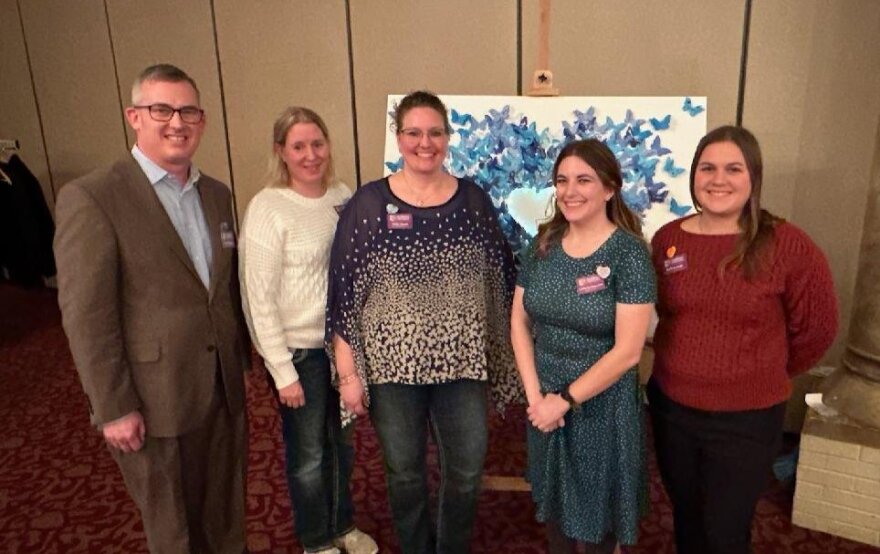Grief is different for every person, but it’s something that many face in their lives, according to Chris Sabourin, the executive director of the Children’s Grief Center of the Great Lakes Bay Region.
One in 16 children younger than 18 years old faces the loss of a parent or a sibling in Midland County, according to the Children's Grief Center and JAG Institute data.
That number increases for Bay and Saginaw Counties due to population and equals to one in 10 kids.
In Michigan, every 11th child grieves for a loved one.

“Grief can’t magically be fixed. It’s a life-changing event,” Sabourin said. “One of my strongest recommendations is to be the best listener you can possibly be because a lot of time people just want to be heard.”
Children’s Grief Center works hard to provide a healing environment for children ages four to 18 who are grieving a death. It has peer support groups across Midland, Bay and Saginaw Counties.

Sabourin said the center has over 150 children attending the support groups and it had served around four thousand kids throughout ten years of its operation. The center was founded in 2014 by Camille Gerace Nitschky and is funded by grants and community partners.
Children’s Grief Center offers two main programs.
First are the evening peer support groups that children can attend twice a month for an hour and a half with their caregivers, Sabourin said. Meanwhile, caregivers can join an adult support group as well.

Sabourin said the children break into four age groups: littles, elementary kids, middle school kids and teens. In the groups, they do different activities such as reading, crafts and games. Then, they come back and play as a big group.
“(Children) feel more empowered,” he said. “They feel a little bit stronger and when they come back to the next group and get a new strategy and we help move them along on their journey.”
Gabby Gauthier, the program director, has worked at the center for nearly eight years managing the curriculum and evening plan for the groups.
“We have fun,” Gauthier said. “It’s a happy place to be able to remember their person and honor them. I think a lot of people think grief center when you think about everyone’s sitting in a circle and crying. And that’s not typically what happens.
“Sometimes we cry. Sometimes we laugh. ... It’s a powerful place where we work on healing.”
The same program happens for the school groups, Sabourin said. The school groups meet once a week for an hour for four to six weeks. And there are 40 schools across 13 counties that are participating.
“The magic really happens when the children realize that they’re sitting next to somebody or playing with somebody who has also experience the death, and then they begin talking ... sharing their stories and the children are realizing that they’re not alone,” Sabourin said.

The groups are also trying to be accommodating, Sabourin said. For example, the evening groups provide dinner, and the school groups were created to be flexible with transportation. They are all free to attend.
“We’re working really hard to break down barriers,” he said.
The group meetings are facilitated by volunteers who are trained to do so, Sabourin said. There are 80 volunteers, and those who don’t facilitate meetings, help hand out materials or help at fundraising events.

Gauthier said the work with kids is rewarding and helped her grow as a therapist as well.
“As a therapist, we’re taught to do a little bit more digging to try to get to the root of the problem, but here it’s a lot of reflecting, and it’s powerful to see how easily kids open up with just reflection,” she said. “Personally, it really helps me connect with my inner child and do all the crafts and all the fun things here and work through my own grief, too.”
The center also provides “good grief bags” with readings and tools for self-help for those who can’t attend the meetings or are going through grieving a pet, Sabourin said.
He said the Children’s Grief Center also hopes to expand their capacity in future. For example, they hope to start offering one-on-one therapy next year and increase programming through other counties, such as Isabella.
Sabourin said those who are looking for help for children grieving a death of a close person can reach out to the center at 989-495-9335.
“There’s so much fear in talking about grief and to be able to give (kids) a safe and comfortable place to be able to share the things that people typically shy away from is really powerful,” Gauthier said. “A lot of times they’re afraid to talk to their family or to people outside of the grief center because of judgment or stigma, and here we can provide them a comfortable place to be able to really let that out.”





